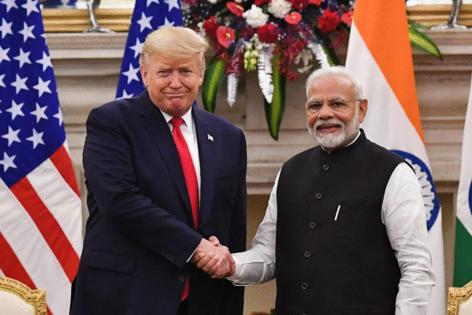Mihir Sharma: Trump won't take the world by surprise a second time
Published in Op Eds
Donald Trump’s first term as president caused chaos and confusion across the world. Few nations knew how to deal with him. Even now, many fear he will prove friendlier to autocrats such as Vladimir Putin and Xi Jinping than he will to stalwart U.S. allies.
For many countries, however, the prospect of Trump’s return is less disconcerting than one might imagine. From India to Turkey to Indonesia, they are confident they will manage just fine — and perhaps even benefit more from their relationship with the U.S. than they did under President Joe Biden.
One could argue they are being naïve. Trump is nothing if not mercurial. As president, for instance, he frequently accused India of taking advantage of the U.S., repeatedly citing its high tariffs on Harley-Davidson motorcycles. (Harleys are, not coincidentally, assembled in the swing states of Wisconsin and Pennsylvania.) He recently blasted the country once again as a “very big abuser” of the international trade system.
But the details of such clashes are telling. At the time, Indian leaders were sparring with the U.S. across a range of issues, from Iran sanctions to New Delhi’s planned purchase of the Russian S-400 missile defense system. Trump’s concerns were far narrower: India effectively placated him by cutting tariffs on the bikes in question.
By contrast, Biden, like most other U.S. presidents, views partnerships with nations such as India as crucially dependent upon shared values. Fellow democracies have a duty to support and strengthen the rules-based international order. If one of them violates that trust, whether by skirting U.S. sanctions or supposedly cheating on trade, it depresses the energy and enthusiasm driving the overall relationship.
When the goal is a future in which India and the U.S. grow ever closer across a wide range of issues — as the U.S. and Europe have — then any sign of the two nations drifting apart paralyzes the relationship. It isn’t surprising, therefore, that over Biden’s time in office multiple influential Americans have worried that the U.S. pivot to India is a “bad bet.” The Indians, in turn, resent the expectation that they must align their values with America’s if they want to be seen as useful partners.
Moreover, the Biden administration can fairly be accused of hypocrisy. When he was elected, there was no shortage of rhetoric about partnering with like-minded democracies and revitalizing multilateral institutions. Then the White House proceeded to take new trade agreements off the table and ensured the World Trade Organization remained unable to handle disputes.
Under Trump, “America First” was a slogan, its implementation patchy and ineffective. Under Biden, a “foreign policy for the middle class” became rigid, protectionist dogma. U.S. partners from Asia to Europe were left struggling to find ways into a new Fortress America.
At least under Trump, the thinking goes, there’s some chance of give-and-take. Officials in New Delhi will be confident that they can give the incoming president what he needs, whether politically or personally. Indian Prime Minister Narendra Modi has held joint campaign rallies with Trump; the latter’s business reportedly has more planned projects in India than in any other foreign country.
And India — sensitive, for good reason, to criticism of its weakening democratic institutions — will welcome a U.S. president who cares little about such issues. So will others. Leaders such as Recep Tayyip Erdogan in Turkey cast themselves — like Trump — as defenders of traditional values against liberal encroachments and as promoters of the national interest in a messy international order. By putting more emphasis on horse-trading where interests align and less on lecturing countries about illiberalism, the incoming president might even expand the map of countries willing to work with Washington on discrete issues.
Of course, to adapt to this more transactional world, countries need to work out what their end of the transaction will be. India may have to make more concrete security commitments, for example, and sign up to buy more U.S. weaponry. The Europeans will certainly have to carry more of the burden of their own defense and show more regulatory flexibility than is their wont. Unlike in 2016, though, few countries need panic just yet.
____
This column does not necessarily reflect the opinion of the editorial board or Bloomberg LP and its owners.
Mihir Sharma is a Bloomberg Opinion columnist. A senior fellow at the Observer Research Foundation in New Delhi, he is author of “Restart: The Last Chance for the Indian Economy.”
_____
©2024 Bloomberg L.P. Visit bloomberg.com/opinion. Distributed by Tribune Content Agency, LLC.




























































Comments